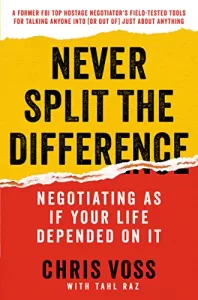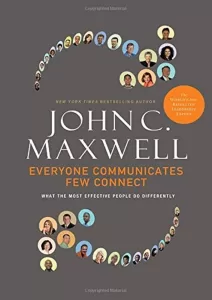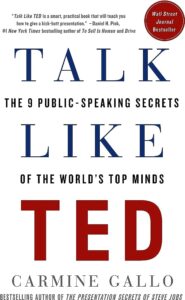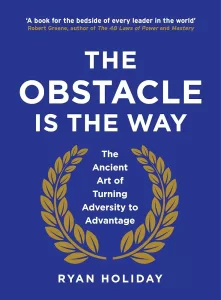Book Review: “Never Split the Difference”
Book: Never Split the Difference by Chris Voss
Reviewer: Bobby Powers
My Thoughts: 9 of 10
This is one of those books I had heard about for years and finally decided to read. It lived up to the hype. Voss's tactics are simple, clear, and proven. He shares dozens of examples from hostage negotiations, salary discussions, sales calls, and business partnerships to explain what works and what doesn't. Voss's MasterClass on "The Art of Negotiation" is also incredible, in case you want to check that out.
What I Learned from the Book
Negotiation is more about listening than it is about talking. The best negotiators are those who can get into the mind of their counterpart to learn what they really want, then find a way to satisfy the other side's spoken and unspoken needs. Throughout any negotiation, it's important to ask calibrated, open-ended questions that help you learn more about their perspective, then show them you understand where they're coming from and want to help them accomplish their goals.
"People who view negotiation as a battle of arguments become overwhelmed by the voices in their head. Negotiation is not an act of battle; it's a process of discovery. The goal is to uncover as much information as possible."
Selected Quotes & Ideas from the Book
Background
- "At any given time, there are ten thousand FBI agents in the Bureau, but only one lead international kidnapping negotiator. That was me."
- "Over the years I had picked up skills, tactics, and a whole approach to human interaction that had not just helped me save lives but, as I recognize now looking back, had also begun to transform my own life. My years of negotiating had infused everything from how I dealt with customer service reps to my parenting style."
- "Yes, our techniques clearly worked with mercenaries, drug dealers, terrorists, and brutal killers. But, I wondered, what about with normal humans? As I'd soon discover in the storied halls of Harvard, our techniques made great sense intellectually, and they worked everywhere."
- "Negotiation serves two distinct, vital life functions—information gathering and behavior influencing—and includes almost any interaction where each party wants something from the other side. Your career, your finances, your reputation, your love life, even the fate of your kids—at some point all of these hinge on your ability to negotiate."
Listening and Empathy
- "Psychotherapy research shows that when individuals feel listened to, they tend to listen to themselves more carefully and to openly evaluate and clarify their own thoughts and feelings. In addition, they tend to become less defensive and oppositional and more willing to listen to other points of view..."
- "The whole concept, which you'll learn as the centerpiece of this book, is called Tactical Empathy. This is listening as a martial art, balancing the subtle behaviors of emotional intelligence and the assertive skills of influence, to gain access to the mind of another person. Contrary to popular opinion, listening is not a passive activity. It is the most active thing you can do."
- "The goal is to identify what your counterparts actually need (monetarily, emotionally, or otherwise) and get them feeling safe enough to talk and talk and talk some more about what they want."
- "It begins with listening, making it about the other people, validating their emotions, and creating enough trust and safety for a real conversation to begin."
- "Empathy is paying attention to another human being, asking what they are feeling, and making a commitment to understanding their world."
- "Tactical empathy is understanding the feelings and mindset of another in the moment and also hearing what is behind those feelings so you increase your influence in all the moments that follow."
Identify and Label Emotions
- "Instead of denying or ignoring emotions, good negotiators identify and influence them. They are able to precisely label emotions, those of others and especially their own."
- "The relationship between an emotionally intelligent negotiator and their counterpart is essentially therapeutic."
- "It may sound touchy-feely, but if you can perceive the emotions of others, you have a chance to turn them to your advantage. The more you know about someone, the more power you have."
- "Labeling is a way of validating someone's emotion by acknowledging it. Give someone's emotion a name and you show you identify with how that person feels."
- "Labels can be phrased as statements or questions. The only difference is whether you end the sentence with a downward or upward inflection. But no matter how they end, labels almost always begin with roughly the same words:
- It seems like...
- It sounds like...
- It looks like..."
Push for "No"
- "At the end of the day, 'Yes' is often a meaningless answer that hides deeper objections (and 'Maybe' is even worse). Pushing hard for 'Yes' doesn't get a negotiator any closer to a win; it just angers the other side. So if 'Yes' can be so damn uncomfortable, and 'No' such a relief, why have we fetishized one and demonized the other?"
- "We have it backward. For good negotiators, 'No' is pure gold. That negative provides a great opportunity for you and the other party to clarify what you really want by eliminating what you don't want."
- "'No' is the start of the negotiation, not the end of it. We've been conditioned to fear the word 'No.' But it is a statement of perception far more often than of fact. It seldom means, 'I have considered all the facts and made a rational choice.' Instead, 'No' is often a decision, frequently temporary, to maintain the status quo. Change is scary, and 'No' provides a little protection from that scariness."
- "When someone tells you 'No,' you need to rethink the word in one of its alternative—and much more real—meanings:
- I am not yet ready to agree;
- You are making me feel uncomfortable;
- I do not understand;
- I don't think I can afford it;
- I want something else;
- I need more information; or
- I want to talk it over with someone else."
Don't Compromise
- "The win-win mindset pushed by so many negotiation experts is usually ineffective and often disastrous. At best, it satisfies neither side. And if you employ it with a counterpart who has a win-lose approach, you're setting yourself up to be swindled."
- "Of course, as we've noted previously, you need to keep the cooperative, rapport-building, empathetic approach, the kind that creates a dynamic in which deals can be made. But you have to get rid of that naïveté. Because compromise—'splitting the difference'—can lead to terrible outcomes. Compromise is often a 'bad deal' and...'no deal is better than a bad deal.'"
- "I'm here to call bullshit on compromise right now. We don't compromise because it's right; we compromise because it is easy and because it saves face. We compromise in order to say that at least we got half the pie...You've got to embrace the hard stuff. That's where the great deals are. And that's what great negotiators do."
- "Deadlines regularly make people say and do impulsive things that are against their best interests, because we all have a natural tendency to rush as a deadline approaches. What good negotiators do is force themselves to resist this urge and take advantage of it in others."
- "If you can get the other party to reveal their problems, pain, and unmet objectives—if you can get at what people are really buying—then you can sell them a vision of their problem that leaves your proposal as the perfect solution."
Tactics He Uses in Negotiation
- Calibrated Questions: Open-ended questions that help you gather more information. "Ask calibrated questions that start with the words 'How' or 'What.' By implicitly asking the other part for help, these questions will give your counterpart an illusion of control and will inspire them to speak at length, revealing important information."
- Late-Night, FM DJ Voice: Deep, soft, slow, and reassuring. The voice of calm and reason. "When you inflect your voice in a downward way, you put it out there that you've got it covered. Talking slowly and clearly you convey one idea: I'm in control."
- Mirroring: Imitation. Copy them to comfort them. "It can be done with speech patterns, body language, vocabulary, tempo, and tone of voice...It's almost laughably simple: for the FBI, a 'mirror' is when you repeat the last three words (or the critical one to three words) of what someone has just said...Use mirrors to encourage the other side to empathize and bond with you, keep people talking, buy your side time to regroup, and encourage your counterparts to reveal their strategy."
- Accusation Audit: List every terrible thing your counterpart could say about you. Doing so takes the sting out of those accusations and shows you understand their perspective. "Performing an accusation audit in advance prepares you to head off negative dynamics before they take root. And because these accusations often sound exaggerated when said aloud, speaking them will encourage the other person to claim that quite the opposite is true."
- The Ackerman Model: An offer-counteroffer bargaining method. "The systematized and easy-to-remember process has only four steps:
- Set your target price (your goal).
- Set your first offer at 65 percent of your target price.
- Calculate three raises of decreasing increments (to 85, 95, and 100 percent). Use lots of empathy and different ways of saying 'No' to get the other side to counter before you increase your offer.
- When calculating the final amount, use precise, nonround numbers like, say, $37,893 rather than $38,000. It gives the number credibility and weight. On your final number, throw in a nonmonetary item (that they probably don't want) to show you're at your limit."
Other Ideas to Keep in Mind
- "In this world, you get what you ask for; you just have to ask correctly."
- "One crucial aspect of any negotiation is to figure out how your adversary arrived at his position."
- "In a recent study, Columbia Business School psychologists found that job applicants who named a range received significantly higher overall salaries than those who offered a number, especially if their range was a 'bolstering range,' in which the low number in the range was what they actually wanted."
- "He who has learned to disagree without being disagreeable has discovered the most valuable secret of negotiation." -Robert Estabrook
- "Your job as a negotiator isn't just to get to an agreement. It's getting to one that can be implemented and making sure that happens...'Yes' is nothing without 'How.' While an agreement is nice, a contract is better, and a signed check is best."
Think you’d like this book?
Other books you may enjoy:
- Getting to Yes by Roger Fisher and William Ury
- Start with No by Jim Camp
- You Can Negotiate Anything by Herb Cohen
Other notable books by the author:
Want to become a stronger leader?
Sign up to get my exclusive
10-page guide for leaders and learners.





